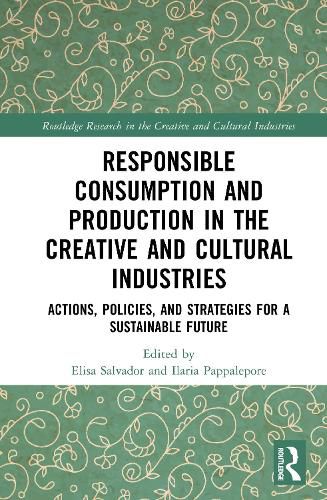Readings Newsletter
Become a Readings Member to make your shopping experience even easier.
Sign in or sign up for free!
You’re not far away from qualifying for FREE standard shipping within Australia
You’ve qualified for FREE standard shipping within Australia
The cart is loading…






No sector can escape the challenge of the climate crisis. This book brings together a team of academic experts to urgently examine the intersection of sustainability and the Cultural and Creative Industries (CCIs), particularly within the framework of Sustainable Development Goal 12 (SDG 12): Responsible Consumption and Production.
Investigating responsible consumption and production across the CCIs, this book explores the role of public policy, funding bodies and other institutional actors in the sustainable transition. It also links CCIs with the development of sustainable tourism and sustainable tourism cities and provides evidence on the role of CCIs in producing positive change in people's behaviours, consumption patterns, and perceptions of the climate emergency. Transformations towards circular economy models in the CCIs are also analysed. In illuminating how the CCIs' are embracing the challenge of sustainable development, the chapters in this book highlight best practices and sustainable solutions across a range of geographic and cultural contexts.
This book will be a valuable resource for researchers, academics and advanced students with an interest in sustainable business practices, especially their application to the CCIs.
$9.00 standard shipping within Australia
FREE standard shipping within Australia for orders over $100.00
Express & International shipping calculated at checkout
No sector can escape the challenge of the climate crisis. This book brings together a team of academic experts to urgently examine the intersection of sustainability and the Cultural and Creative Industries (CCIs), particularly within the framework of Sustainable Development Goal 12 (SDG 12): Responsible Consumption and Production.
Investigating responsible consumption and production across the CCIs, this book explores the role of public policy, funding bodies and other institutional actors in the sustainable transition. It also links CCIs with the development of sustainable tourism and sustainable tourism cities and provides evidence on the role of CCIs in producing positive change in people's behaviours, consumption patterns, and perceptions of the climate emergency. Transformations towards circular economy models in the CCIs are also analysed. In illuminating how the CCIs' are embracing the challenge of sustainable development, the chapters in this book highlight best practices and sustainable solutions across a range of geographic and cultural contexts.
This book will be a valuable resource for researchers, academics and advanced students with an interest in sustainable business practices, especially their application to the CCIs.